Choosing the Right Drill Bit for Concrete: A Comprehensive Guide

Drilling into concrete can be a challenging task, especially if you don’t have the right tools. One of the most important tools you’ll need is a drill bit specifically designed for concrete. With so many options available, it can be difficult to know which one is right for your project.
There are several factors to consider when choosing a drill bit for concrete. The first is the type of concrete you’ll be drilling into. Different types of concrete require different types of drill bits. For example, if you’re drilling into reinforced concrete, you’ll need a drill bit specifically designed to handle the metal rebar that’s embedded within the concrete.
Another important factor to consider is the size of the hole you’ll be drilling. Drill bits come in a variety of sizes, so it’s important to choose one that’s the right size for your needs. If you’re drilling a small hole, a smaller drill bit will be sufficient. However, if you’re drilling a larger hole, you’ll need a larger bit.
Finally, consider the material of the drill bit itself. Carbide-tipped drill bits are the most commonly used for drilling into concrete, as they offer a good balance of durability and affordability. However, if you’re drilling into particularly hard or abrasive concrete, you may want to consider a diamond-tipped drill bit, which is more expensive but offers superior performance.
Choosing the right drill bit for concrete is essential to ensure that your project is successful. By considering factors such as the type of concrete, the size of the hole, and the material of the drill bit, you can make an informed decision and achieve the best results.
Understanding Concrete Drilling
- Concrete drilling is a common process used in construction and renovation projects to create holes or openings in concrete and other masonry materials. It is essential for installing electrical wiring, plumbing pipes, or anchoring fixtures and fittings.
- Drilling in concrete requires specialized tools and techniques due to the dense and abrasive nature of the material. Concrete is a composite material made of cement, aggregate, and water. It is known for its strength and durability.
- Types of concrete drilling methods include:
- Hammer drilling: In this method, a hammer drill is used to create holes in concrete. The drill bit has a hammering action that breaks the concrete while rotating. It is suitable for drilling small to medium-sized holes.
- Core drilling: Core drilling involves using a diamond-tipped core drill bit to create large-diameter holes in concrete. This method is commonly used for creating openings for plumbing pipes, electrical conduits, and HVAC ducts.
- Rotary drilling: Rotary drilling is typically used for drilling very large holes in concrete. It involves the use of a rotary drilling rig that uses a rotary drill bit to grind through the concrete.
- Factors to consider when choosing a drilling method include the size and depth of the hole, the type and strength of the concrete, and the equipment and tools available.
- Choosing the right drill bit is crucial for successful concrete drilling. The drill bit should be made of a durable material, such as carbide or diamond, that can withstand the abrasive nature of the concrete. The size and type of the drill bit will depend on the specific drilling requirements.
- Safety precautions should be taken when drilling in concrete. It is important to wear protective goggles, gloves, and a dust mask to prevent injuries from flying debris and to protect against the inhalation of dust particles.
Factors to Consider
When choosing a drill bit for concrete, there are several factors that you should consider to ensure you select the right one for your specific job. These factors include:
- Drill Bit Type: There are different types of drill bits available for concrete, including masonry bits, carbide-tipped bits, and diamond-tipped bits. Each type has its own advantages and is suitable for different applications.
- Drilling Speed: The drilling speed required for your project is an essential factor to consider. Different drill bits have different capabilities, so you need to choose one that can meet your drilling speed requirements.
- Drilling Technique: The drilling technique you use can also affect the performance of the drill bit. Some drill bits work best with a rotary drilling technique, while others are designed for use with a hammer drilling technique. Consider the technique you will be using and choose a drill bit that is compatible with it.
- Drill Bit Size: The size of the hole you need to drill will also determine the size of the drill bit you need. Be sure to choose a drill bit that matches the diameter of the hole you want to create.
- Desired Hole Depth: The depth of the hole you want to drill is another factor to consider. Some drill bits are designed for shallow holes, while others can handle deeper drilling. Make sure the drill bit you choose can accommodate the desired hole depth.
- Concrete Type: The type of concrete you will be drilling into can impact the performance and durability of the drill bit. Some drill bits are more suitable for softer concrete, while others are designed for harder or reinforced concrete. Consider the type of concrete you will be working with and choose a drill bit that is appropriate for it.
By taking these factors into account, you can ensure that you choose the right drill bit for your concrete drilling needs.
Types of Drill Bits for Concrete
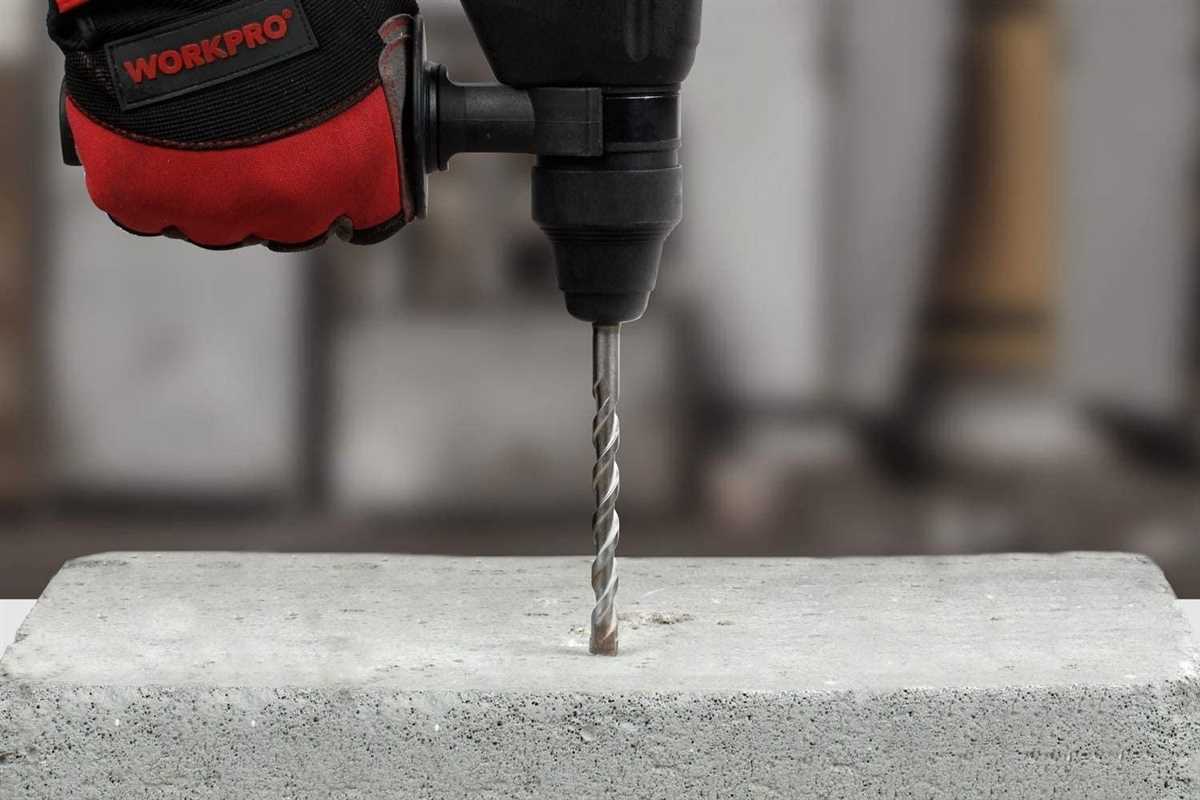
When it comes to drilling into concrete, it’s important to use the right type of drill bit. Concrete is a tough and durable material, so you’ll need a drill bit that is specifically designed to handle its hardness. Here are some of the most common types of drill bits for concrete:
1. Masonry Drill Bits
Masonry drill bits are the most commonly used drill bits for concrete. They are made of high-speed steel or tungsten carbide, which allows them to effectively drill through concrete and other masonry materials. Masonry drill bits typically have a wide spiral flute design, which helps to quickly remove the drilled material from the hole.
2. Carbide Tipped Drill Bits
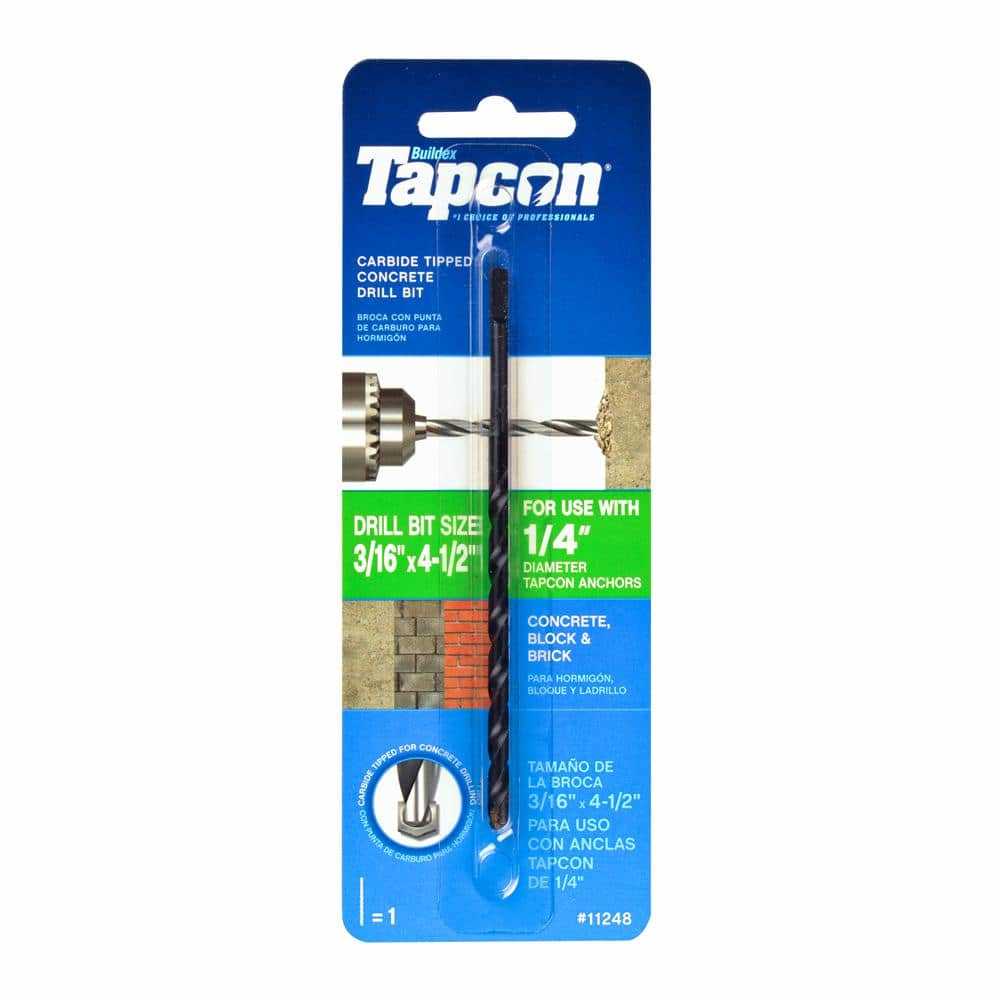
Carbide tipped drill bits are another popular choice for drilling into concrete. These drill bits have a carbide tip, which is extremely hard and durable. The carbide tip allows the drill bit to penetrate the concrete with ease, making it a great option for both professional and DIY projects. Carbide tipped drill bits are available in various sizes and typically have a longer life span compared to masonry drill bits.
3. Diamond Core Drill Bits
Diamond core drill bits are used when you need to make larger diameter holes in concrete. These drill bits have a cylindrical shape with diamond-encrusted tips. The diamonds on the drill bit’s surface help to grind through the concrete, allowing for fast and efficient drilling. Diamond core drill bits are commonly used in construction and plumbing projects.
4. SDS Drill Bits
SDS drill bits are specifically designed for use with SDS drills, which are known for their hammering action. These drill bits have a unique shank that allows them to easily lock into the drill chuck and withstand the high forces produced during drilling. SDS drill bits are available in various sizes and are commonly used in professional applications.
When choosing a drill bit for concrete, it’s important to consider the size of the hole you need to drill, as well as the type of drill you’ll be using. Additionally, always ensure that your drill bit is sharp and in good condition before starting any drilling project.

| Drill Bit Type | Advantages | Disadvantages |
|---|---|---|
| Masonry Drill Bits | Widely available, suitable for most general concrete drilling tasks | May wear out faster compared to other types |
| Carbide Tipped Drill Bits | Durable, suitable for high-speed drilling, long lifespan | More expensive compared to masonry drill bits |
| Diamond Core Drill Bits | Efficient for drilling large diameter holes, long lifespan | Can be expensive, specialized equipment required |
| SDS Drill Bits | Quick and easy attachment to SDS drills, withstand high forces | Requires an SDS drill, limited sizes available |
Choosing the Right Size
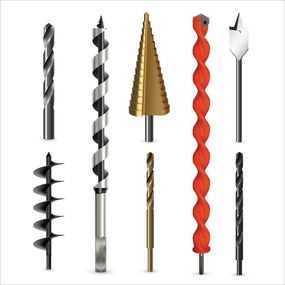
When it comes to drilling into concrete, choosing the right size of drill bit is crucial for a successful outcome. Using the wrong size can result in a lack of precision and may even damage the drill or the concrete itself. To ensure you select the appropriate size, consider the following factors:
1. The Size of the Hole
Determine the desired size of the hole you need to drill. This will depend on the purpose of the hole and the fixtures you plan to install. Measure the diameter of the fixture and add a little extra space for ease of installation. Make sure the drill bit you choose matches the diameter of the hole you require.
2. The Shank Size
Consider the shank size of the drill bit. The shank is the part of the bit that fits into the drill’s chuck. Ensure that the shank size of the bit matches the chuck size of your drill. Using a drill bit with the wrong shank size will prevent it from fitting properly and could cause damage.
3. The Drill’s Capabilities
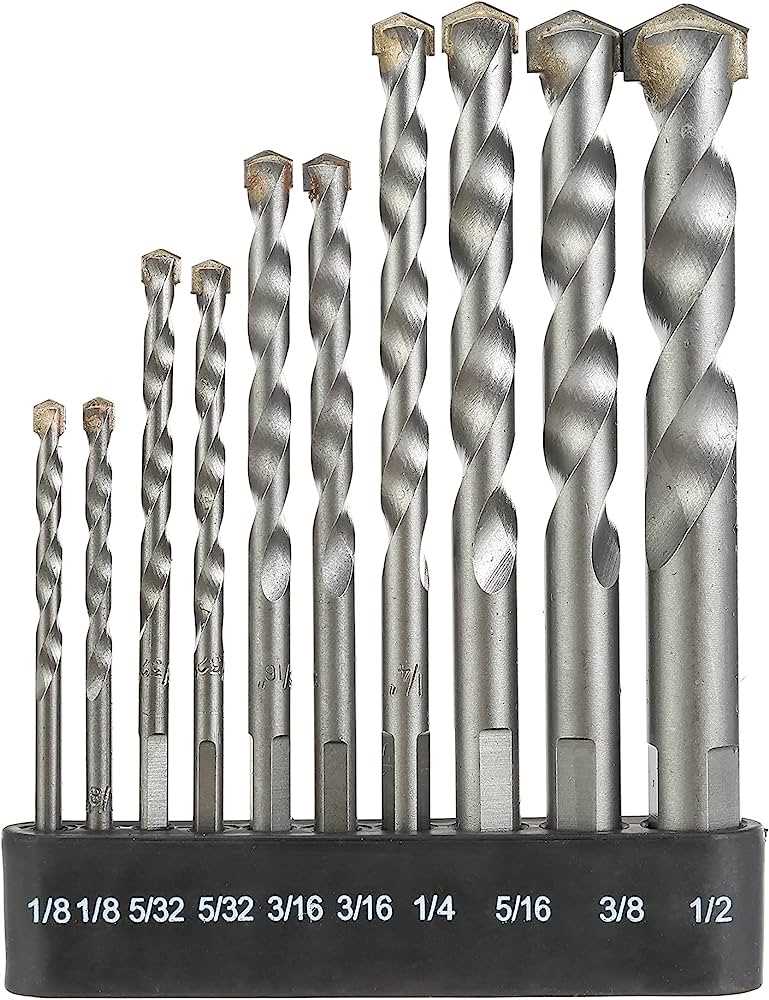

Understand the capabilities of your drill. Different drills have different power and speed settings, which can affect the efficiency of drilling into concrete. If you are using a cordless drill or a less powerful drill, it may be more suitable to choose a slightly smaller drill bit to prevent the drill from straining or overheating.
4. The Project Requirements
Consider the requirements of your specific project. Are you drilling a single hole or multiple holes? The size and number of holes needed will influence the size of the drill bit required. If you are working on a large-scale project with many holes to be drilled, it may be more efficient to choose a slightly larger drill bit to save time and effort.
5. The Material Being Drilled
Take into account the type of concrete or masonry material you are drilling into. Different materials may require different drill bit sizes to achieve optimal results. Harder materials may require larger bits, while softer materials may be better suited to smaller bits. Consult the manufacturer’s guidelines or seek professional advice if you are unsure.
Remember, the right size drill bit is essential for a successful concrete drilling project. By considering the factors mentioned above, you can make an informed decision and ensure that you choose the correct size drill bit for your needs.
Maintenance and Care
Proper maintenance and care are essential for extending the life of your concrete drill bit and ensuring its optimal performance. Here are some tips to help you take care of your drill bit:

- Clean the Drill Bit: After each use, clean the drill bit thoroughly to remove any concrete residue or debris. Use a brush or compressed air to clean it, and make sure there are no leftover materials on the tip or flutes.
- Inspect for Damage: Before using the drill bit, inspect it for any signs of damage, such as chipped or worn-out cutting edges. If you notice any damage, replace the bit to avoid any accidents or reduced drilling performance.
- Store Properly: When not in use, store the drill bit in a dry and clean place. Keep it in its original packaging or use a storage case to prevent any damage or rusting.
- Use Lubrication: When drilling into concrete, using a lubricant can help reduce heat and friction, improving the drill bit’s performance and preventing premature wear.
- Avoid Excessive Heat: Concrete drill bits are designed to withstand high temperatures, but excessive heat can still damage them. Avoid prolonged drilling periods and let the bit cool down periodically during use.
- Choose the Right Speed and Pressure: Using the correct drilling speed and applying appropriate pressure can prevent damage to the drill bit. Follow the manufacturer’s recommendations for speed and pressure settings.
By following these maintenance and care tips, you can ensure that your concrete drill bit remains in excellent condition for a longer time, allowing you to achieve precise and efficient drilling results.
Popular Brands
1. Bosch
Bosch is a well-known brand in the power tool industry. They offer a wide range of drill bits for concrete, including carbide-tipped and masonry bits. Bosch drill bits are known for their durability and performance. They are designed to handle tough materials like concrete and can provide fast and efficient drilling.
2. DeWalt
DeWalt is another popular brand that offers high-quality drill bits for concrete. Their concrete drill bits are made from hardened steel and feature a carbide tip for increased durability and strength. DeWalt drill bits are designed to deliver smooth and precise drilling in concrete and other masonry materials.
3. Makita
Makita is a trusted brand in the construction industry and offers a variety of drill bits for concrete. Their drill bits are made from high-quality materials and are designed to provide excellent performance and long-lasting durability. Makita’s concrete drill bits are known for their precision and ability to drill through tough materials.
4. Irwin Tools
Irwin Tools is a well-respected brand that manufactures a range of drill bits for concrete. Their concrete drill bits are made from solid carbide and feature a unique flute design for efficient chip removal. Irwin Tools drill bits offer exceptional durability and can handle heavy-duty drilling in concrete and other hard materials.
5. Hilti
Hilti is a leading brand in the construction industry and offers a wide range of high-quality drill bits for concrete. Their drill bits are made from premium materials and are designed to provide fast and precise drilling in concrete and other masonry materials. Hilti drill bits are known for their durability and performance in tough drilling applications.
6. Milwaukee
Milwaukee is a trusted brand that offers a variety of drill bits for concrete. Their drill bits are made from high-quality materials and are designed to provide exceptional performance and durability. Milwaukee’s concrete drill bits are known for their long life and ability to handle heavy-duty drilling tasks.
7. Hitachi
Hitachi is a well-known brand in the power tool industry and offers a range of drill bits for concrete. Their drill bits are made from high-quality materials and feature a carbide tip for increased durability and strength. Hitachi drill bits are designed to provide fast and efficient drilling in concrete and other masonry materials.
Tips and Tricks
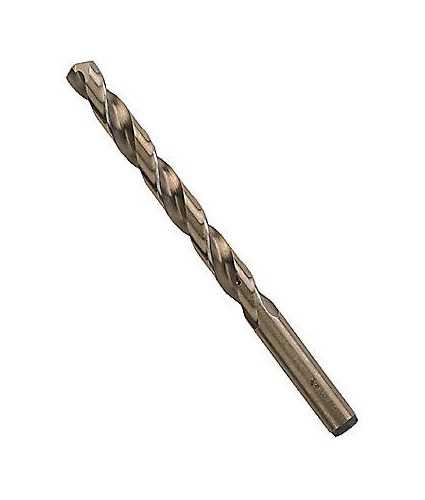
1. Choose the right drill bit size
When drilling into concrete, it is essential to use the correct drill bit size. The size of the drill bit you need will depend on the size of the hole you want to create. Using the wrong size can result in inefficient drilling or even damage to the drill or the concrete. Make sure to refer to the drill bit size chart or consult with a professional if you are unsure.
2. Use a masonry bit
When drilling into concrete, it is crucial to use a masonry drill bit, also known as a concrete drill bit. These drill bits are specially designed to handle the hard and abrasive nature of concrete. Using a regular drill bit can result in dulling or even breaking the bit.
3. Start drilling at a slow speed
Concrete is a tough material, so it is important to start drilling at a slow speed to prevent any accidents or damage. Starting at a slow speed allows you to gain control over the drilling process and ensures that the drill bit can penetrate the concrete smoothly.
4. Apply steady pressure
Applying steady pressure while drilling into concrete helps ensure that the drill bit remains in contact with the surface and can effectively create the hole. Avoid using excessive force as it can cause the drill to kick back or the bit to overheat. A consistent and steady pressure is key.
5. Use water for cooling
Drilling into concrete generates heat, which can cause the drill bit to overheat and become less effective. To prevent this, you can use water to cool down the drill bit as you drill. Simply spray a small amount of water onto the drill bit periodically to keep it cool.
6. Clear the hole regularly
Concrete dust and debris can accumulate in the hole while drilling, which can hinder your progress and affect the quality of the hole. Clear the hole regularly by removing the dust and debris using a vacuum or a brush. This will help maintain the efficiency of the drilling process.
7. Avoid drilling too close to the edge
When drilling into concrete, it is important to avoid drilling too close to the edge to prevent cracking or chipping. Make sure to leave an appropriate distance from the edge, typically about 1 inch or more, depending on the thickness and strength of the concrete.
8. Use a hammer drill for tougher concrete
If you are dealing with tougher concrete or drilling into reinforced concrete, consider using a hammer drill. A hammer drill uses a pulsating action to break through the concrete, making it more efficient and effective for these types of applications.
9. Wear protective gear
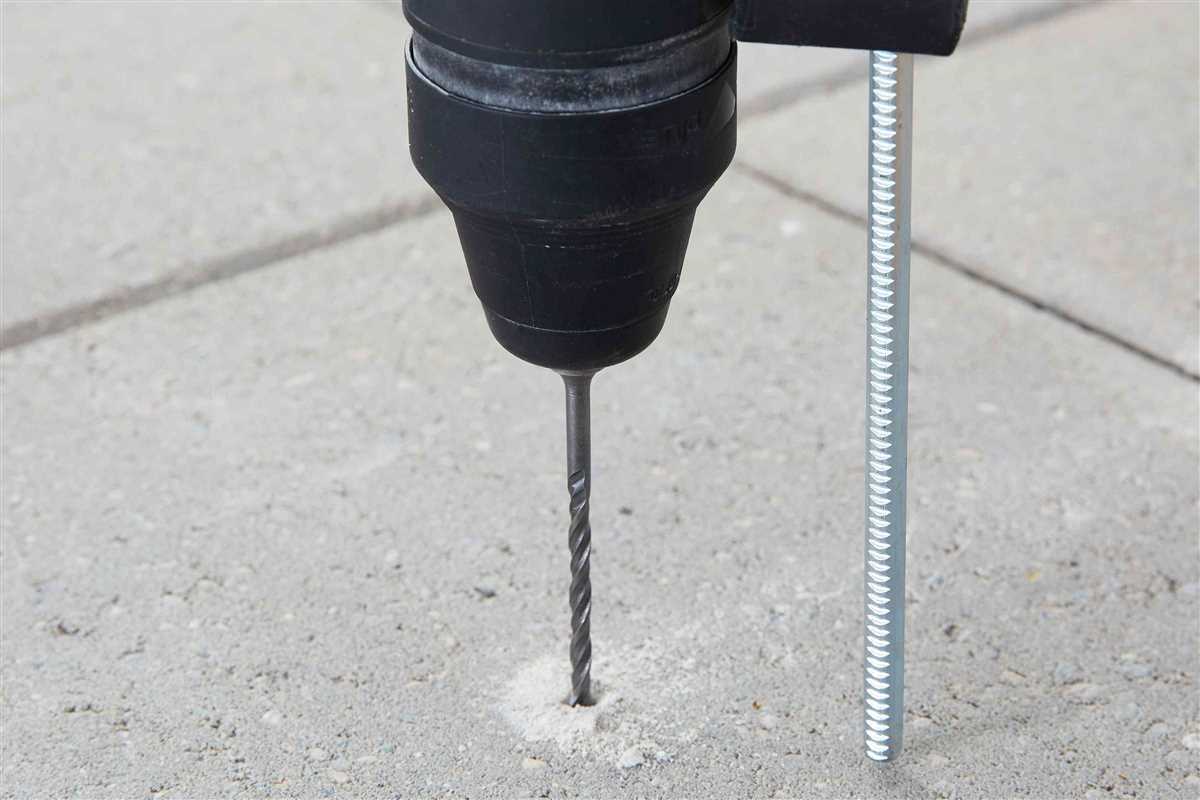
Concrete drilling can create dust, debris, and noise, so it is important to wear appropriate protective gear. This may include safety goggles, a dust mask, ear protection, and gloves. Protecting yourself will ensure a safe and comfortable drilling experience.
10. Seek professional help if needed
If you are unsure about the drilling process or have complex drilling needs, it is best to seek the help of a professional. They have the knowledge, experience, and equipment to handle any drilling task efficiently and safely.
FAQ:
What are the different types of drill bits for concrete?
There are several types of drill bits for concrete, including masonry bits, rotary hammer bits, and carbide-tipped masonry bits. Each type is designed for specific drilling needs and provides different levels of performance and durability.
What is the difference between masonry bits and rotary hammer bits?
Masonry bits are used with a regular drill and are designed for light-duty drilling in concrete. Rotary hammer bits, on the other hand, are used with a rotary hammer drill and are ideal for heavy-duty drilling in tough materials like concrete.
How do carbide-tipped masonry bits work?
Carbide-tipped masonry bits are designed with a hard carbide tip that is resistant to wear and heat. The carbide tip helps to effectively drill through tough materials like concrete by breaking up the material and creating a hole.
What factors should I consider when choosing a drill bit for concrete?
When choosing a drill bit for concrete, you should consider factors like the type of drill you will be using, the depth of the hole you need to drill, and the hardness of the material you will be drilling into. These factors will help determine the appropriate type and size of drill bit to use.
Video:








